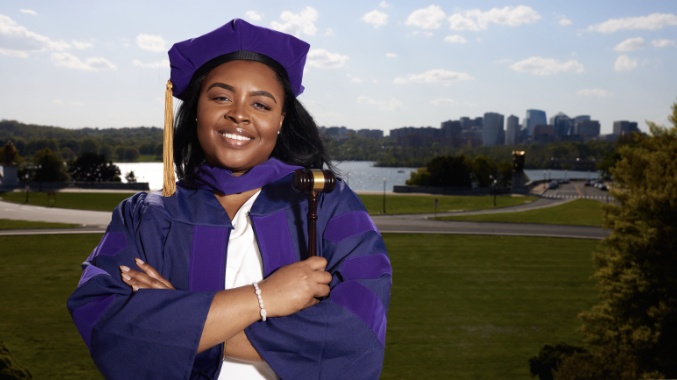Alexis Hawkins, a student expelled from a Washington, D.C. high school as a teen, is now graduating from Howard University School of Law.
“I just had to keep believing in myself, stay focused and not give up on my goals,” the 28-year-old told The Washington Post.
The HBCU graduate was out of school for six months after getting involved in a brawl when she was 15 years old at Ballou High School, located near the Congress Park neighborhood in southeast D.C.
“Congress Park girls were known to fight — and Alexis was a fighter,” Edwin Buckner, a D.C. police officer who was patrolling Ballou High at the time, said. “She was also an A student and never bothered anyone. But she would not back down from a fight if it involved her neighborhood.”
When Hawkins resumed her education, she enrolled at the Woodland Job Corps Center and earned a GED. The D.C. native then saved enough money to attend Benedict College in Columbia, South Carolina, where she majored in criminal justice.
Now, 13 years after getting expelled, Hawkins is a Howard Law School graduate. The graduate, who grew up in the foster care system, said it was easy for children such as herself to take a wrong turn in the neighborhood where she lived.
"We band together for protection. We fight out of loyalty and friendship, right or wrong,” she said. “The result is just more trauma that goes unaddressed.”
The young woman found a turning point in 2008 when she embarked on a week-long civil rights tour organized by Peaceoholics, a D.C. anti-violence group. The trip brought together girls from rival neighborhoods, allowing them to visit historical sites throughout the South and to meet civil rights activists.
One of the activists who met with the group was Annie Lee Cooper, who told the girls about her experience of getting beat by a Dallas officer while waiting in line to register to vote in 1965. Cooper said she retaliated, punching the sheriff in the face and knocking him to the ground.
Hawkins was moved by the activist's story.
"Annie Cooper made me realize that I was fighting the wrong people," she said. "I was fighting people who looked like me, Black girls who came from the same community, who had gone through the same hardships. She made me understand that I should be using my mind, my energy to fight racism and dismantle systems of oppression that create underserved neighborhoods and school-to-prison pipelines.”
The Howard graduate also relied on other supportive figures as she attempted to get her life on track. That's including Buckner, who stepped up like a father figure. The officer rented a limousine and took Hawkins to a Ballou High prom after she graduated from Benedict College, making up for the one she missed due to the expulsion.
Sherri Beatty-Arthur, an administrative judge, encouraged the young woman when she was having doubts about law school.
“I wanted Alexis to know that I was cheering for her,” Beatty-Arthur said. “I wanted her to imagine a world where Black women cheered for each other and did not get manipulated into fighting one another. I wanted her to know that I would help her, and all I asked in return was for her to do the same for someone else.”
The law student will now take the bar exam as she continues to chase her dream of becoming a judge.
“Although my accomplishments are rare for where I came from, I will work to make sure that is not the case for long,” Hawkins said. “I want girls like me to have even more opportunities than I had, even more support, and I will always be reaching back, giving back and pulling them forward.”
On Monday, Howard University School of Law received a $10 million grant from the Jerome L. Greene Foundation, an initiative that supports achievement in science, medicine and the law. The $10 million grant, which is the largest donation ever given to Howard University School of Law, supports the institution's Greene Public Service Scholars Program. Recipients of the Greene Public Service Scholars Program are rewarded with a three-year, full-tuition scholarship, the school stated in a press release.
As Blavity previously reported, HBCUs have produced 80% of the Black judges in the country.
